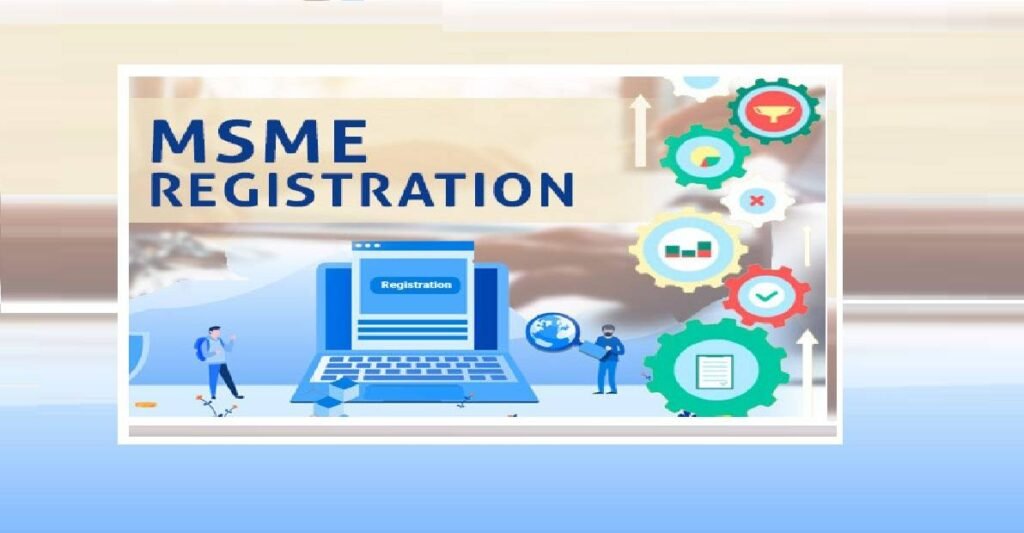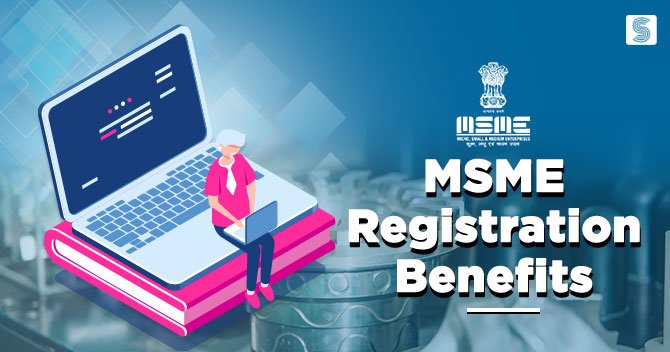The first and most important step for any Micro, Small, or Medium Enterprise (MSME) is formal recognition. If you are asking what is msme registration, the answer is simple: it is the process of getting certified under the Ministry of MSME.
The current system is called msme udyam registration. This fully online, paperless system was introduced on July 1, 2020, replacing the older Udyog Aadhaar registration. By completing msme registration online, your enterprise, known as an Udyam, receives a permanent msme registration number and a formal certificate.

MSME Registration Eligibility and Criteria
A highly common question is who is eligible for msme registration. Any new or existing business can apply for msme registration if it meets the specific investment and turnover limits set by the Ministry of MSME.
The msme registration eligibility is crucial. The criteria depend entirely on the financial size of your business. The system is inclusive, allowing many types of firms, including a msme registration for partnership firm or a msme registration for private limited company, to apply.
MSME Registration Turnover Limit and Investment
The msme registration criteria categorize enterprises based on two limits: investment in plant and machinery/equipment, and msme registration turnover limit (annual turnover).
| Criteria | Micro Enterprise | Small Enterprise | Medium Enterprise |
|---|---|---|---|
| Previous Investment & Turnover | Up to Rs. 1 crore | Up to Rs. 10 crore | Up to Rs. 50 crore |
| Revised Investment & Turnover | Up to Rs. 2.5 crore | Up to Rs. 25 crore | Up to Rs. 125 crore |
| Previous Turnover Limit | Up to Rs. 5 crore | Up to Rs. 50 crore | Up to Rs. 250 crore |
| Revised Turnover Limit | Up to Rs. 10 crore | Up to Rs. 100 crore | Up to Rs. 500 crore |


Documents Required for MSME Registration
The new Udyam system has minimal paperwork because it is integrated with government databases. When considering the documents required for msme registration, the process relies heavily on three key identifiers.
The full list of msme registration required documents is straightforward:
- Aadhaar Card: This is mandatory. The Aadhaar number must belong to the proprietor (for a proprietorship), the managing partner (for a partnership firm), or the Karta (for a Hindu Undivided Family).
- PAN Card: The Permanent Account Number for the business is required.
- GSTIN: The Goods and Services Tax Identification Number is mandatory for msme registration starting from April 1, 2021. If you are wondering about gst registration for msme, having an active GSTIN is now a necessary part of the process for most businesses.
- Bank Account Details: You need the bank’s name, Account number, and IFSC code.
- Financial Details: While investment and turnover details are often taken automatically from Income Tax and GST databases, you must provide accurate financial details during the process.
- Self-Declaration: You must provide a self-declaration confirming the accuracy of all provided information.
Step-by-Step MSME Registration Online Process
The process of how to msme registration is designed for Ease of Doing Business. It is entirely free when completed through the official government portal. Here is how to apply for msme registration:
- Visit the Official Portal: Start your msme registration process by visiting the official Udyam Registration portal. The process is totally free.
- Provide Identification: Enter your Aadhaar number and PAN number. This is used to verify your identity.
- Enter Business Information: Provide key details, including the business name, address, and GSTIN. The system will automatically fetch investment and turnover data from the government databases.
- Upload Required Documents: Upload necessary documents for msme registration, such as the PAN card and bank details.
- Self-Declaration: Provide a self-declaration confirming that all facts are accurate and truthful. Misrepresentation can lead to penalty under section 27 of the MSME Development Act, 2006.
- Verification and Issuance: After submission, the system performs msme registration verification against government databases.

Key MSME Registration Benefits
You might ask, is msme registration mandatory? It is not strictly mandatory, but it is highly recommended as it is a prerequisite for accessing vast government support and is essential for availing the various programs of the Ministry of MSME.
The msme registration benefits are substantial and target financial support, market access, and compliance simplification:
- Financial and Tax Benefits:
- Loans at lower rates of interest: An Udyam-registered enterprise becomes eligible to obtain a loan with subsidised interest, sometimes receiving collateral-free credit under government schemes.
- Tax Rebates: Registered businesses enjoy various tax rebates and concessions.
- Special 50% discount on Government fees for Trademark and Patent filing.
- Concession in Electricity Bills.
- Market and Protection Benefits:
- Special Preference in Government Tenders: Businesses get a higher preference and opportunity to participate in tenders reserved exclusively for registered businesses.
- Protection Against Delayed Payments: The registration provides protection under the MSME Development Act, 2006, ensuring timely payment from buyers.
- Fast Resolution of Disputes.
- Access to Schemes: Eligibility for schemes like the Credit Linked Capital Subsidies (CLCSS) for technological upgrades and the Women Entrepreneurship Scheme.
Managing Your MSME Registration and Certificate
Once your application is successfully processed, a permanent msme registration number is issued, along with an official certificate.
How to check msme registration
- Visit the official Udyam Registration Portal.
- Navigate to the ‘Print/Verify’ tab.
- Select ‘Verify Udyam Registration Number’.
- Enter your 19-digit Udyam Registration/Reference Number.
- Input the valid verification code displayed in the Captcha image.
- Click the ‘Verify’ button to view your registration status.
How to download msme registration certificate?
- Access the Udyam Registration Portal.
- Click on the ‘Print/Verify’ option, then select ‘Print Udyam Certificate’.
- Enter your Udyam Registration Number and your mobile number.
- Choose the OTP option (mobile or email) and click ‘Validate & Generate OTP’.
- Enter the OTP received and click ‘Validate OTP and Login’.
- Once logged in, you can print your Udyam Registration Certificate.
Retrieving a Forgotten MSME Registration Number
It is not possible to directly search for an MSME registration number by name. However, you can retrieve it by:
- Visiting the Udyam Registration Portal.
- On the homepage, under the ‘Print/Verify’ section, click on the ‘Forgot Udyam/UAM No.’ option.
- Select the relevant registration option.
- Choose the OTP option (mobile number or email address).
- Enter your registered mobile number or email address.
- Click ‘Validate & Generate OTP’.
- After entering the received OTP, your MSME registration number will be displayed.

The Udyam Advantage: Benefits of MSME Registration
MSME registration unlocks a comprehensive suite of benefits and support schemes from the government, significantly aiding the growth and sustainability of businesses. These advantages span various aspects of operations, from finance to market access:
- Access to Financial Support: Businesses can avail themselves of collateral-free loans and credit facilities from banks and other financial institutions. Interest rates on such loans are often significantly lower, typically around 1-1.5%, offering a substantial financial advantage.
- Government Procurement and Tenders: Registered MSMEs receive priority and are eligible to participate in various government procurement contracts and tenders. The Udyam Registration Portal’s integration with the Government e-Marketplace and various State Government portals provides streamlined access to these opportunities.
- Operational Incentives: MSMEs are granted priority in the allocation of essential resources such as land, utility connections, and support for infrastructure expansion.
- Growth and Development Concessions: The government offers concessions and incentives aimed at technology upgradation, marketing initiatives, and export promotion to help MSMEs enhance their competitiveness.
- Tax Advantages: Registered enterprises can benefit from various direct and indirect tax advantages and exemptions, contributing to improved profitability.
- Extended Credit for MAT: The credit for Minimum Alternate Tax (MAT) can be carried forward for an extended period of up to 15 years, as opposed to the standard 10 years, providing greater financial flexibility.
- Reduced Costs: The cost associated with obtaining patents or setting up new industrial units is often reduced through available rebates and concessions.
- Protection Against Delayed Payments: MSME registration provides a mechanism for protection against delayed payments from buyers, ensuring healthier cash flow.
- Scheme Eligibility: MSMEs become eligible for numerous government schemes, including the Credit Guarantee Scheme, Credit Linked Capital Subsidy Scheme, and Public Procurement Policy.
- Priority Sector Lending: Banks prioritize lending to MSMEs, ensuring easier access to necessary capital.
- Waiver of Security Deposit: MSMEs can benefit from a government security deposit waiver, which is particularly helpful when participating in e-tenders.
- Flexibility in Activities: A single MSME registration allows for the inclusion or specification of any number of business activities, whether service, manufacturing, or both.
- Subsidies and Reimbursements: Specific benefits include subsidies for barcode registration, reimbursement of ISO certification fees, and concessions on electricity bills.
- International Trade Exposure: Registered MSMEs often receive special consideration when participating in international trade fairs, opening doors to global markets.

Conclusion
MSME registration in India, through the Udyam Portal, represents a crucial strategic step for micro, small, and medium enterprises. With over 1 crore registered MSMEs employing approximately 7.5 crore individuals and contributing significantly to the nation’s manufacturing output (36%) and exports (45%), their importance cannot be overstated. By embracing this streamlined, free, and self-declaration-based system, businesses can unlock a vast array of government benefits, fostering their establishment, growth, and contribution to India’s economic prowess. The Udyam system not only simplifies compliance but also empowers entrepreneurs to harness vital support, ensuring their sustained development in a competitive landscape.
Any business (e.g., Proprietorship, Partnership, Private Limited Company) meeting specific investment and annual turnover criteria can apply. The key documents required for msme registration are the owner’s Aadhaar Card, the business PAN Card, and the GSTIN number (mandatory since April 1, 2021). Investment and turnover details are taken automatically from government databases.
Registered MSMEs gain crucial support, including:
• Loans at lower rates of interest and collateral-free credit.
• Protection against delayed payments under the MSME Development Act, 2006.
• Special Preference in Procuring Government Tender.
• Tax Rebates and a Special 50% discount on Government fees for Trademark and Patent filing.
The Udyam Registration remains valid for a lifetime; there is no need for renewal of Registration. However, existing enterprises previously under Udyog Aadhaar must re-register themselves. The registration must be updated if the business exceeds MSME limits.
After the application is verified, the Udyam Registration Certificate is issued online. You can download msme registration certificate anytime from the official portal. The certificate contains a dynamic QR Code which allows quick msme registration verification of the enterprise details.
Support is provided through Single Window Systems at Champions Control Rooms and District Industries Centres (DICs). Registered enterprises can access schemes like:
• Credit Linked Capital Subsidies (CLCSS): For technological upgrades.
• Zero Defect Zero Effect (ZED): Focuses on quality improvement.
• Women Entrepreneurship Scheme: Provides tailored financial assistance and training.
Benefits include access to collateral-free loans, eligibility for government tenders, priority in utility connections, concessions in technology upgrades, and direct/indirect tax advantages.
While an Aadhaar card is generally compulsory, individuals without one can have their registration filed by a DIC or MSME-DE. Alternatives like Voter ID or PAN card can be provided temporarily.
No, it is not possible to directly check the MSME registration number by name. However, you can retrieve your registration number on the Udyam Portal using your mobile number or email address.

